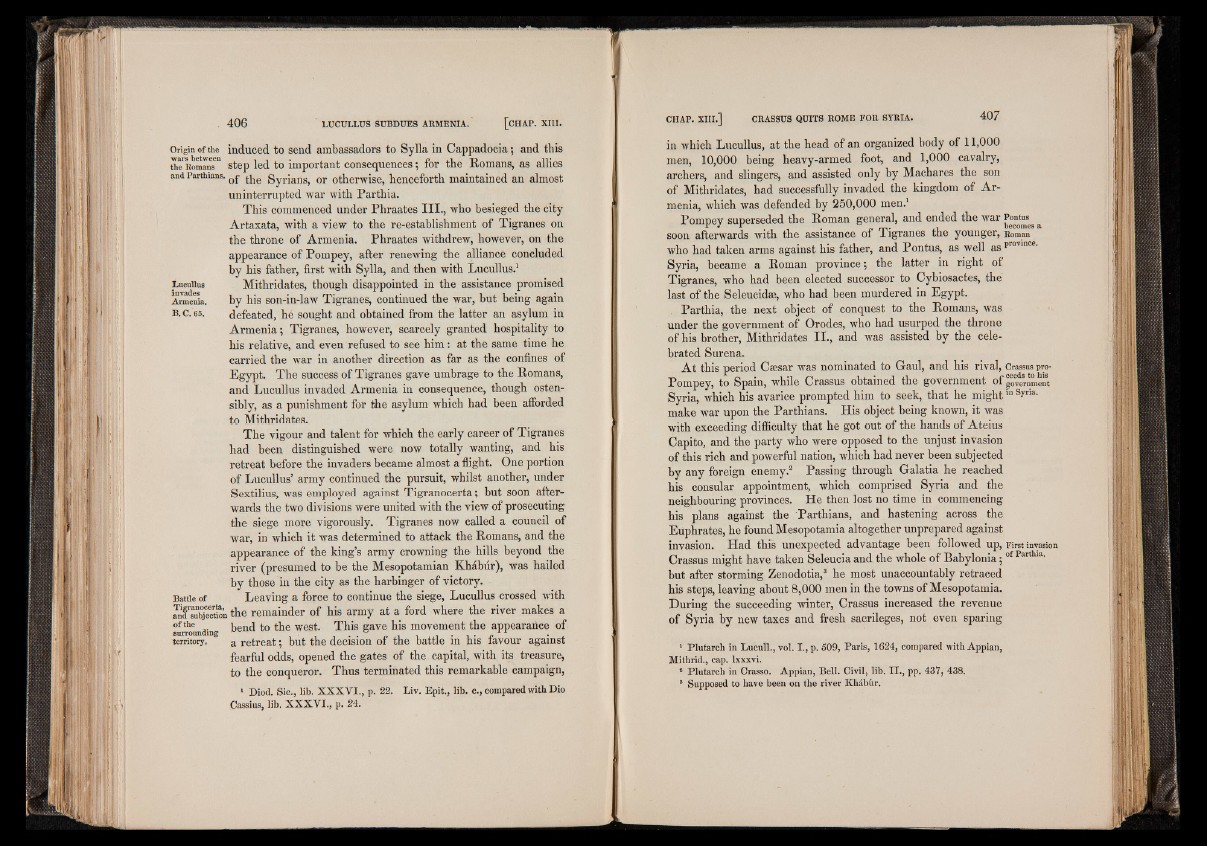
Origin of the induced to send ambassadors to Sylla in Cappadocia; and this
fte'itomans11 step led to important consequences; for the Romans, as allies
and Parthians. 0p gyrjanS) or otherwise, henceforth maintained an almost
uninterrupted war with Parthia.
This commenced under Phraates III., who besieged the city
Artaxata, with a view to the re-establishment of Tigranes on
the throne of Armenia. Phraates withdrew, however, on the
appearance of Pompey, after renewing the alliance concluded
by his father, first with Sylla, and then with Lucullus.1
Lncniius Mithridates, though disappointed in the assistance promised
Armenia. by his son-in-law Tigranes, continued the war, but being again
B. c. 65. defeated, he sought and obtained from the latter an asylum in
Armenia; Tigranes, however, scarcely granted hospitality to
his relative, and even refused to see him: at the same time he
carried the war in another direction as far as the confines of
Egypt. The success of Tigranes gave umbrage to the Romans,
and Lucullus invaded Armenia in consequence, though ostensibly,
as a punishment for the asylum which had been afforded
to Mithridates.
The vigour and talent for which the early career of Tigranes
had been distinguished were now totally wanting, and his
retreat before the invaders became almost a flight. One portion
of Lucullus’ army continued the pursuit, whilst another, under
Sextilius, was employed against Tigranocerta; but soon afterwards
the two divisions were united with the view of prosecuting
the siege more vigorously. Tigranes now called a council of
war, in which it was determined to attack the Romans, and the
appearance of the king’s army crowning the- hills beyond the
river (presumed to be the Mesopotamian Khabur), was hailed
by those in the city as the harbinger of victory.
Battle of Leaving a force to continue the siege, Lucullus crossed with
Jnfsu^ecti^n the remainder of his army at a ford where the river makes a
surrounding bend to the west. This gave his movement the appearance of
territory. a retreat; but the decision of the battle in his favour against
fearful odds, opened the gates of the capital, with its treasure,
to the conqueror. Thus terminated this remarkable campaign,
1 Diod. Sic., lib. X X X V I., p. 22. Liv. Epit., lib. c., compared with Dio
Cassius, lib. X X X V I., p. 24.
in which Lucullus, at the head of an organized body of 11,000
men, 10,000 being heavy-armed foot, and 1,000 cavalry,
archers, and slingers, and assisted only by Machares the son
of Mithridates, had successfully invaded the kingdom of Armenia,
which was defended by 250,000 men.1
Pompey superseded the Roman general, and ended the war Sgptas ^
soon afterwards with the assistance of Tigranes the younger, Roman
who had taken arms against his father, and Pontus, as well a sprovmce'
Syria, became a Roman province; the latter in right of
Tigranes, who had been elected successor to Cybiosactes, the
last of the Seleucidae, who had been murdered in Egypt.
Parthia, the next object of conquest to the Romans, was
under the government of Orodes, who had usurped the throne
of his brother, Mithridates II., and was assisted by the celebrated
Surena.
At this period Caesar was nominated to Gaul, and his rival, Crassus pro-
Pompey, to Spam, whde Crassus obtained the government of g0vernment
Syria, which his avarice prompted him to seek, that he mightin Syria-
make war upon the Parthians. His object being known, it was
with exceeding difficulty that he got out of the hands of Ateius
Capito, and the party who were opposed to the unjust invasion
of this rich and powerful nation, which had never been subjected
by any foreign enemy.2 Passing through Galatia he reached
his consular appointment, which comprised Syria and the
neighbouring provinces. He then lost no time in commencing
his plans against the Parthians, and hastening across the
Euphrates, he found Mesopotamia altogether unprepared against
invasion. Had this unexpected advantage been followed up, First invasion
Crassus might have taken Seleucia and the whole of Babylonia; of Partlua-
but after storming Zenodotia,3 he most unaccountably retraced
his steps, leaving about 8,000 men in the towns of Mesopotamia.
During the succeeding winter, Crassus increased the revenue
of Syria by new taxes and fresh sacrileges, not even sparing
1 Plutarch in Lucull., vol. I ., p. 509, Paris, 1624, compared with Appian,
Mithrid., cap. lxxxvi.
8 Plutarch in Crasso. Appian, Bell. Civil, lib. I I ., pp. 437, 438.
8 Supposed to have been on the river Khabur,